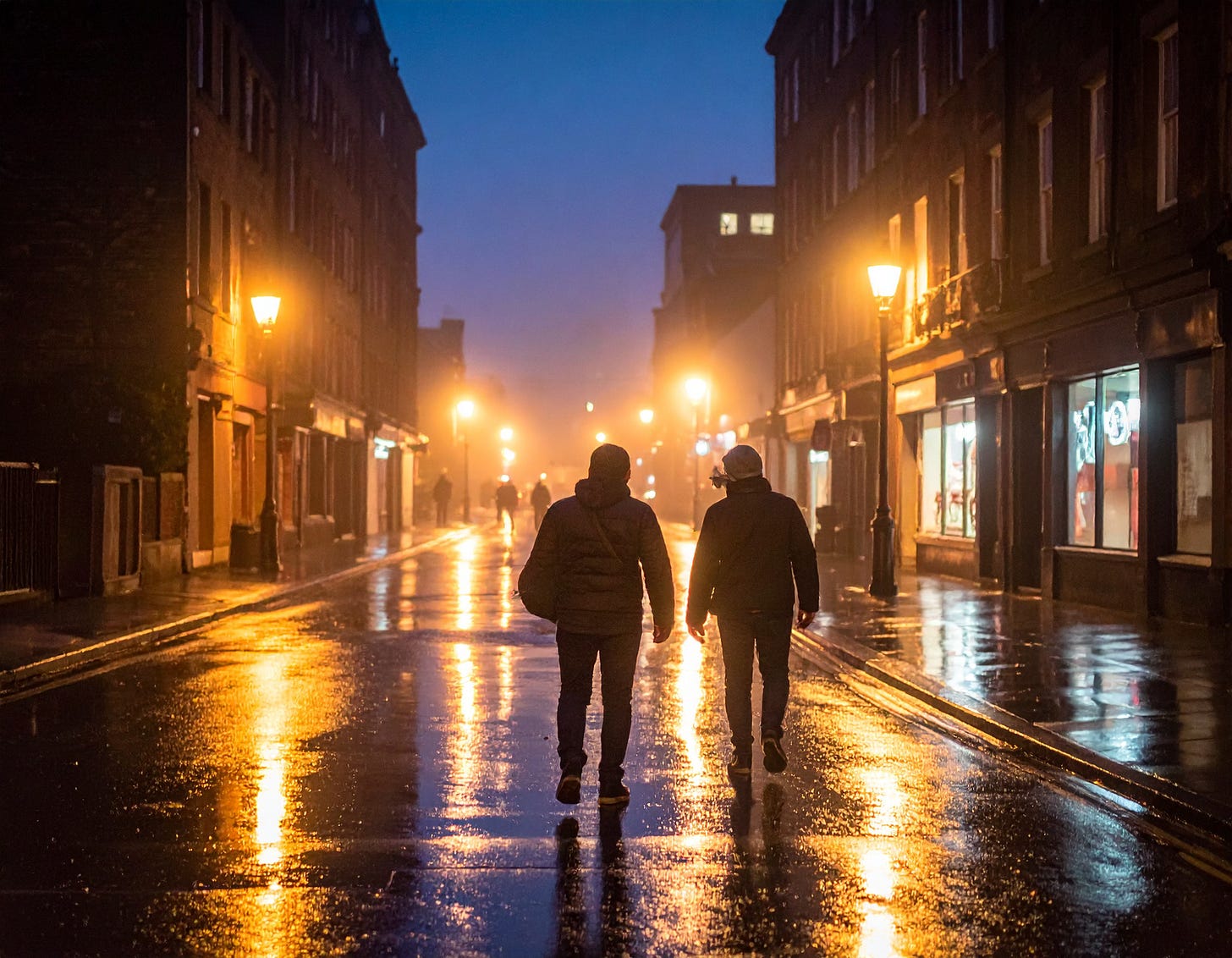The Stuff Between Us
It may happen when you lift your collar, stepping through some truly bilious weather one Friday morning in November, watching pale commuters work the tough roads west. It may happen when you see your shit neighbours in hi-vis, honestly, the silent ones that never smile, scurrying back in horizontal rain, tugging bins behind them, to rest by the phlegm green door of No. 33 again, the dark windows, the curtains still drawn on something nobody wants; thy shut the door. And it happens when you meet those first steppers, hunched up, crammed into themselves, staying back from the kerbs and gutters, eyes to the ground, off to collect six rashers of back bacon, or that undelivered parcel, or perhaps an almond decaf latte before six hours of work in their mouldy bedroom. It may even happen fetching twenty quid from the hole-in-the-wall to next Donna’s-Tanning to pay for the last day’s first baggy.
You notice it when you’re catching up with your nan about that time with Nat and Ajay over cribbage at Nina’s, the broken matchstick, the really big slap, the slammed doors. Ajay crying, “He really did it, Nat. He absolutely fucking did it.” It may even happen on the 62, when you can’t see out for all the running condensation, the crowds and two cripples pressing you into your seat, and you nearly miss your stop amid the dark fumes of Ten Acres Lane. I mean, the more you think about it, the more you feel it, the more you see it. The everywhere-among-us-all of it, you know? The shared lofty and banal silt of it all. The stuff. Stuff the keeps us apart and brings us together. All the stuff between us.
And I want to mention all this because of the risk involved. The risk of writing it down for them. The risk of writing to them about all this stuff. For we all know the drill, you know, how it’s all about you forever; you come first, they don’t matter. They are irrelevant. Except, of course, they do matter. They matter because they are wholly in it, making it happen in the way it must. And while you might put them in it, as they’re in it in these paragraphs, it only occurs when they hear it and read it and form it, between you, between each of them, but especially between you and them.
Once, I heard this story about particles, and how small these pieces are, and the breaking apart, smaller and smaller, not infinitesimally smaller, but still, smaller, not fragments but whole things, almost inconceivably small. And then the naming of these little, little things, and imagining a sort of tiny universe of tiny things. Dark and meaningless. Without cause. Beyond origin. Except, of course, all things begin, as all things end. But I mention this because despite this desire to fragment and isolate, the power of all these tiny things is their relationships, the invisible thing that brings them together in, and in doing so, makes all things. And it’s not the particles; it’s the relationship between them that is the power in all things. Invisible, mysterious, connecting. Call it what you like. I call it love. The reason of love.
When I think of experimentation in form and content, I think of the forces that bring us together. You might consider this social cohesion is an evolutionary force. But particles don’t evolve, and the force that unites them, diverts them, misplaces, displaces and brings order – that is simply there, between them in the undiscovered world. Perhaps the experimental is the communitarian absolute. It resists the idea that we are alone in the fractured world, pieces of no whole, buying and producing what capitalism needs us too. It resists the literature of this world, isolating us in the fetishisation of solitary market forces, the myth of the exemplary life of the individual production unit, scouring the uninhabited language on behalf of the ravages of consumerism. There, I’ve said it now. A literature of communitarianism is the leading edge, the avant garde, the fighting edge of all the joy of being human. And the challenge, I guess, is finding what language, which languages, this aim necessitates. What forms of language – and I don’t discard complex language – allows access for everyone. For the real power of art doesn’t lie in what separates us into commodities – purchasers and providers – but what unites us into a people. All the gorgeous stuff between us.



